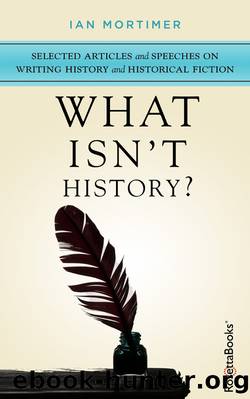What Isn't History? by Ian Mortimer

Author:Ian Mortimer [Mortimer, Ian]
Language: eng
Format: epub
Tags: Language Arts & Disciplines, Writing, Nonfiction (Incl. Memoirs), Fiction Writing, History, Historiography
ISBN: 9780795350535
Google: E2mHDwAAQBAJ
Publisher: Rosetta Books
Published: 2017-04-09T00:27:11+00:00
9. Historical Novelists Should Not Be Ashamed of Telling Lies
[First published in BBC History (July 2010), p. 47]
It can hardly have escaped notice that a number of historians have started writing historical fiction. It is in some respects a strange phenomenon. Historians are supposed to purvey historical facts; inventing things about the past is the very last thing they are expected to do. Some people find the idea troubling. What are the implications of historians making things up, putting thoughts into the minds of long-dead people, and even inventing speeches for them? Are such people not mere charlatans?
I would not like to try and answer for every historian who has written fiction but, as I have now joined their ranks (albeit under my middle names, James Forrester), perhaps my own views might be considered representative. This is even more the case as, in Sacred Treason (set in December 1563), I have consciously broken two of the golden rules which traditionally permit historical fiction to retain a veneer of credibility. In particular I have broken the rule that says the fiction should follow the known historical facts wherever possible; and I have completely disregarded the instruction that one should not attribute invented thoughts, words and actions to well-known historical characters. Five or six of my main characters appear in The Oxford Dictionary of National Biographyâin fact, I wrote the ODNB entry for one of them myself: the chronicler Henry Machyn (1496x8â1563). But if you look him up you will find that his second wife was called Dorothy, not Rebecca. I have deliberately âgot it wrongâ. Two of my characters are the subjects of multiple biographies (William Cecil and Francis Walsingham): there is plenty of scope in their cases for contradicting the historical record. But how much my fictional depiction of them mirrors historical reality is hardly a significant point when the entire plot underpinning my narrative is entirely imaginary. I overtly state in an authorâs note that the principal character of the novel, William Harley, Clarenceux King of Arms, is based on the real Clarenceux in 1563, William Harvey, but I have made Harley do and say things that Harvey never did or said.
Does that make me a historical cheat and a liar? Perhaps. In fact, yes, in some senses. But in one respectâby far the most important oneâthe answer is no. I never doubted that the story I wanted to tell needed to be set in the sixteenth century. I could have chosen to write a novel about the modern world, and to look at faith and treason in the people around me. But I did not. I wanted to describe a world in which religious doubt and disloyalty to the throne were mixed together in one sense of betrayal. I needed the past to provide a platform for a book that is not just entertaining and a thriller but also a direct exploration of a manâs relationships with the State and God, unencumbered by the modern readerâs expectations about daily life in the modern world.
Download
This site does not store any files on its server. We only index and link to content provided by other sites. Please contact the content providers to delete copyright contents if any and email us, we'll remove relevant links or contents immediately.
| Publishing & Books | Research |
| Writing |
Asking the Right Questions: A Guide to Critical Thinking by M. Neil Browne & Stuart M. Keeley(5751)
Autoboyography by Christina Lauren(5221)
Eat That Frog! by Brian Tracy(4509)
Dialogue by Robert McKee(4385)
Sticky Fingers by Joe Hagan(4181)
Journeys Out of the Body by Robert Monroe(3608)
Annapurna by Maurice Herzog(3460)
Full Circle by Michael Palin(3437)
Schaum's Quick Guide to Writing Great Short Stories by Margaret Lucke(3368)
Elements of Style 2017 by Richard De A'Morelli(3336)
The Art of Dramatic Writing: Its Basis in the Creative Interpretation of Human Motives by Egri Lajos(3057)
Why I Write by George Orwell(2944)
Atlas Obscura by Joshua Foer(2943)
The Diviners by Libba Bray(2925)
The Fight by Norman Mailer(2922)
In Patagonia by Bruce Chatwin(2916)
The Mental Game of Writing: How to Overcome Obstacles, Stay Creative and Productive, and Free Your Mind for Success by James Scott Bell(2894)
Venice by Jan Morris(2565)
The Elements of Style by William Strunk and E. B. White(2464)
